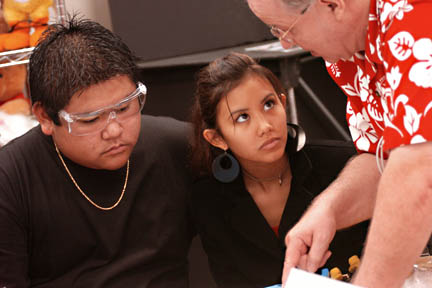
|
Archimedes Project volunteers
modify playthings for disabled
kids to enjoy
Wearing plastic goggles and a look of concentration in her eyes, 17-year-old Katie Kubo of Maryknoll High School connects wires to a small device for a toy carousel.
The mechanism will later be attached to another piece to enable a disabled child to activate the toy using light pressure.
"It gives me a good feeling that I'm able to do this for the children," said Kubo, a senior who plans on becoming a mechanical engineer.
In less than an hour, Kubo was already working on her next toy: a stuffed animal named Tigger that bounces around when you press its head. Her goal is to modify the stuffed animal as she did with the carousel so a disabled child can play with it.
In a Santa Claus-like workshop, nine students from various public and private schools on Oahu worked diligently Saturday during a session held in Kalihi to alter toys for disabled children.
And with about 25,000 disabled children in Hawaii, there's plenty of work to do, said Neil Scott, founder of Archimedes Project Hawaii, which develops technology to enhance the quality of life for disabled people and seniors.
The workshop is held by Archimedes and sponsored by isisHawaii and Women in Technology.
The first Archimedes Project at Stanford University was co-founded by Scott in 1992. He was chief engineer and director until 2003, when he moved to Hawaii to start the Hawaii project.
With Archimedes' help, disabled children who suffer from conditions such as cerebral palsy and spinal cord injury can activate toys that previously were off limits.

Moanalua High students Bryson Ganal, left, and Briana Sandoval-Padaynag received instructions from Archimedes founder Neil Scott.
Andi Kubota, care coordination manager of Shriners Hospital for Children, commended the engineers of Archimedes and students for making toys accessible to disabled children.
"They have gone the extra step to modify it so kids can actually enjoy and participate in playing with the toy," said Kubota.
"Just watching their nonverbal action when they're playing with a toy, words are very difficult to explain that emotion of witnessing that," she added.
At the workshop, students learn the basic fundamentals of engineering. In turn, they gain a sense of gratification through their volunteer work.
"That will give them a reason instead of an ordinary science thing at school, which wouldn't be very fun," said Scott. "We can see the huge smiles of glee. They just beam with satisfaction when they do something with their hands."
"It makes me feel that I've accomplished something," said Meagan Hamm, a ninth-grader at Moanalua High School who attended the workshop for the third time and wants to pursue a career in electronic engineering.
She noted the expense of a modified toy that could cost up to $50.
"The parents of the disabled children don't get a lot of toys because they are so expensive. Making these, a couple of pieces of wood and plastic and a little button, it benefits them because they get to play with those toys," Hamm said.
Those interested in attending future workshops can call the Women in Technology project, Oahu Division, at 284-6038, or isisHawaii at 988-1931.
[News] [Business] [Features] [Sports] [Editorial] [Do It Electric!]
[Classified Ads] [Search] [Subscribe] [Info] [Letter to Editor]
[Feedback]

